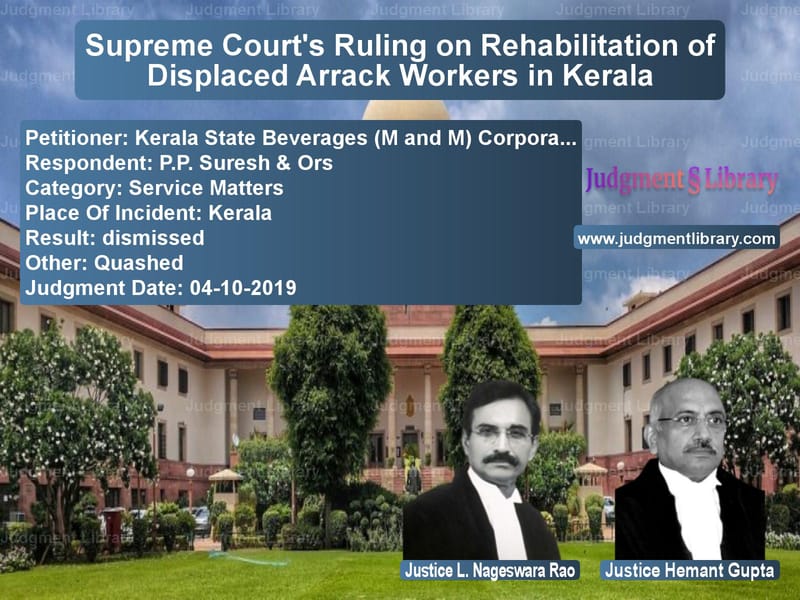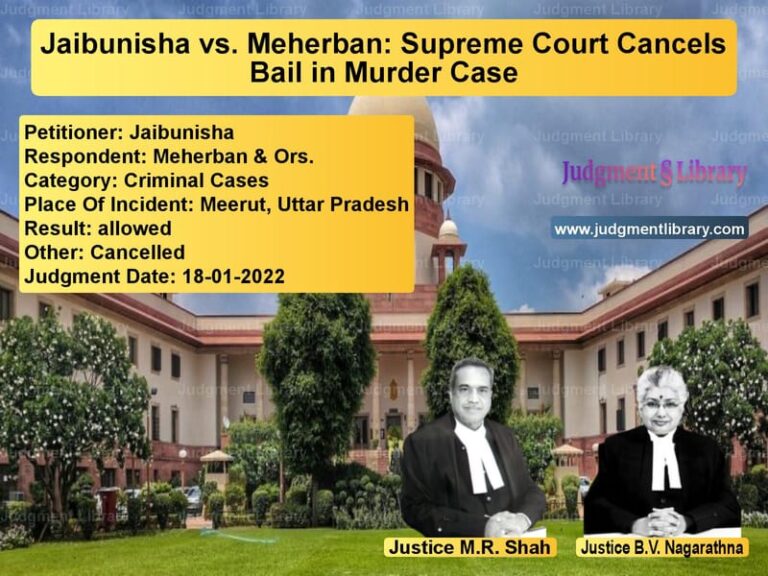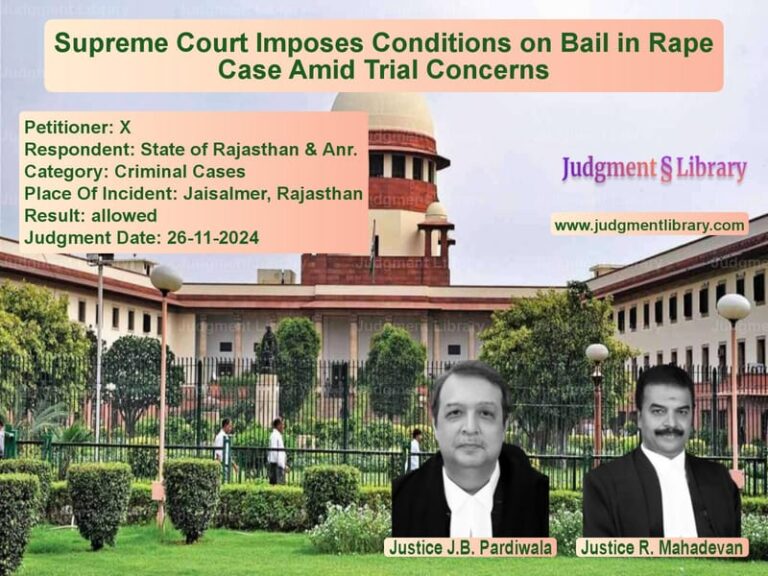Supreme Court’s Ruling on Rehabilitation of Displaced Arrack Workers in Kerala
The Supreme Court of India delivered a significant judgment concerning the rehabilitation of displaced arrack workers in Kerala, who were affected by the ban on arrack in the state. The case primarily dealt with the legality of the government’s decision to modify a 2002 Government Order regarding the employment of displaced workers. This case has broader implications for the rights of workers whose livelihoods are disrupted by government policies, and it highlights the balance between public interest and individual rights.
Background of the Case
In the state of Kerala, arrack shops were abolished in 1996, leaving around 12,500 workers jobless. In response to this, the state government provided compensation to these displaced workers, but this did not satisfy the workers, leading to protests and demands for rehabilitation. Subsequently, the government issued G.O.(Rt) No.81/2002/TD on February 20, 2002, which promised to reserve 25% of all future daily wage employment vacancies in Kerala State Beverages (M and M) Corporation for the displaced workers. However, in 2004, the government modified the policy to limit the opportunity only to the dependent sons of deceased arrack workers.
The displaced workers challenged this modification in court, claiming it was arbitrary and violated their rights under the Constitution. The Kerala High Court, after hearing the matter, found in favor of the workers and directed the government to implement the 2002 Government Order. The State, however, appealed the decision, arguing that the policy was changed due to administrative difficulties and overriding public interest. The matter then reached the Supreme Court.
Arguments by the Petitioner (State of Kerala)
- The State argued that the modification of the Government Order was necessary due to the lack of available vacancies in the corporation and the administrative challenges faced in implementing the policy.
- The government contended that a blanket approach to rehabilitating all displaced workers was not feasible given the limited number of daily wage vacancies.
- Additionally, the state emphasized that the decision to restrict the benefits to the dependent sons of deceased workers was made to address immediate needs of the families of those who had passed away after the ban on arrack.
- The government also argued that there was no vested right created by the 2002 order and that the modification of the order was a policy decision that could not be challenged.
Arguments by the Respondents (Displaced Arrack Workers)
- The displaced workers, represented by various unions, argued that the government’s modification of the policy was arbitrary and unreasonable.
- They contended that the 2002 Government Order created a legitimate expectation that all displaced workers would be rehabilitated and that the change in policy violated this expectation.
- The workers also argued that the ban on arrack had resulted in the loss of their livelihoods, and the promise made by the government to provide rehabilitation had created a legal obligation that the state should fulfill.
- The respondents further argued that the failure to implement the original order led to prolonged unemployment and deprivation of livelihood, which violated their rights under Articles 14, 19, and 21 of the Constitution.
Supreme Court’s Observations and Judgment
The Supreme Court, in a judgment delivered by Justices L. Nageswara Rao and Hemant Gupta, agreed with the State’s argument that the modification of the policy was necessary to address practical challenges. The Court’s key observations included:
- “While the 2002 Government Order created legitimate expectations, it cannot be said to have conferred a vested right on the workers to demand employment as a matter of right.”
- The Court accepted the State’s argument that administrative difficulties and the small number of available vacancies justified the modification of the policy.
- The Court also noted that the decision to limit the benefits to the dependent sons of deceased workers was taken to address the immediate needs of families who had lost their breadwinners due to the ban.
- “The change in policy, while unfortunate, was not arbitrary or unreasonable given the public interest involved.”
- The Court emphasized that the government’s decision to modify the policy was within its discretion and that it did not violate the workers’ fundamental rights.
The Supreme Court concluded that the policy modification was in the public interest and that the respondents did not have a legitimate expectation that they would be rehired. The Court allowed the appeal by the State, thereby setting aside the Kerala High Court’s judgment.
Key Takeaways from the Judgment
- The ruling underscores the principle that legitimate expectations must be grounded in clear and unequivocal promises, and they cannot create a vested right to employment unless explicitly guaranteed by law.
- The Court affirmed that policy changes by the government, particularly those related to public welfare, can be made in response to administrative difficulties or changing circumstances.
- While the displaced workers had a reasonable expectation of rehabilitation, the government’s decision to modify the policy was based on overriding public interest and thus did not infringe upon their constitutional rights.
- The case also highlights the tension between individual rights and government discretion in formulating and modifying public policies.
Final Verdict
The Supreme Court’s judgment in this case serves as an important precedent for similar disputes involving public policy changes and workers’ rights. It emphasizes that while the government must fulfill its promises, it also has the discretion to modify policies in the public interest, provided such changes are not arbitrary or unreasonable.
The decision reinforces the idea that the executive’s discretion to change policies, especially those concerning public welfare, is protected under the principle of proportionality and is subject to judicial review to ensure fairness.
Petitioner Name: Kerala State Beverages (M and M) Corporation Limited.Respondent Name: P.P. Suresh & Ors.Judgment By: Justice L. Nageswara Rao, Justice Hemant Gupta.Place Of Incident: Kerala.Judgment Date: 04-10-2019.
Don’t miss out on the full details! Download the complete judgment in PDF format below and gain valuable insights instantly!
Download Judgment: Kerala State Beverag vs P.P. Suresh & Ors Supreme Court of India Judgment Dated 04-10-2019.pdf
Direct Downlaod Judgment: Direct downlaod this Judgment
See all petitions in Employment Disputes
See all petitions in Workplace Harassment
See all petitions in Public Sector Employees
See all petitions in Termination Cases
See all petitions in Judgment by L. Nageswara Rao
See all petitions in Judgment by Hemant Gupta
See all petitions in dismissed
See all petitions in Quashed
See all petitions in supreme court of India judgments October 2019
See all petitions in 2019 judgments
See all posts in Service Matters Category
See all allowed petitions in Service Matters Category
See all Dismissed petitions in Service Matters Category
See all partially allowed petitions in Service Matters Category







